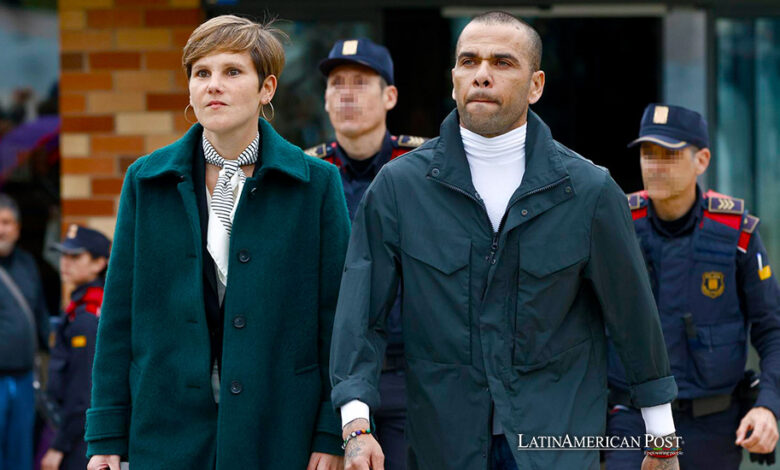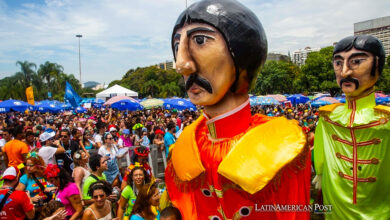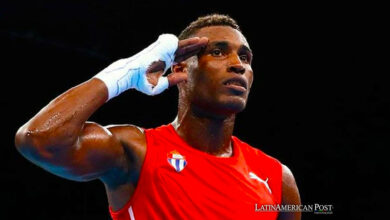Brazilian Soccer Star Dani Alves Secures Release from Jail

International soccer star Dani Alves secures conditional release from Spanish jail on €1m bail after a rape conviction. This case not only shakes the soccer world but also ignites discussions on justice and celebrity influence across Latin America and beyond.
Examining Dani Alves’ Legal Saga
Dani Alves, the renowned Brazilian soccer player, recently made headlines not for his on-field prowess but for a controversial legal battle in Spain. Convicted of rape in a Barcelona nightclub in 2022, Alves was sentenced to four-and-a-half years in prison. In a dramatic turn of events, a Spanish court has allowed his conditional release after posting a €1 million bail, sparking a widespread debate on justice and privilege.
Alves, who had been in pre-trial detention since January 2023, is now awaiting the appeal process outside bars. While legally permissible, the decision to grant bail has been met with public outcry and criticism, particularly from the victim’s legal representation, who decried it as a glaring example of wealth’s sway in judicial proceedings.
This case is not isolated but reflects broader issues within the Latin American context, where the interplay of fame, wealth, and legal outcomes is often scrutinized. Across the region, similar incidents involving public figures have raised questions about the fairness of the justice system and the societal treatment of sexual assault allegations.
Alves’ situation resonates strongly in Latin America, where soccer is deeply ingrained in the cultural fabric. The case has triggered discussions about the responsibility of celebrities and athletes in their off-field behavior and the example they set for fans worldwide.
Navigating Legal Complexities
The legal saga of Alves, a player celebrated for his achievements with clubs like Barcelona and PSG and his significant role in Brazil’s national team, underscores the complexities of navigating legal systems for public figures. The condition of his release, which includes surrendering his Brazilian and Spanish passports and weekly court appearances, highlights the delicate balance between ensuring justice and respecting legal rights.
Alves’ shifting testimony during the trial, where he eventually admitted to having consensual sex after initially denying any encounter, has further complicated public perception. This inconsistency, coupled with the severity of the charges, paints a troubling picture of the challenges faced by victims of sexual assault in seeking justice, especially against influential individuals.
The “Only Yes is Yes” principle, recently incorporated into Spanish law, emphasizing the necessity of consent, marks a significant step in addressing sexual violence. However, the Alves case illustrates the ongoing struggle to apply these principles fairly and consistently, regardless of the accused’s status.
In Latin America, where issues of gender-based violence and celebrity impunity often intersect, the Alves case is seen as a litmus test for the effectiveness of legal reforms and the influence of public opinion on judicial outcomes. It serves as a poignant reminder of the pervasive challenges in tackling sexual assault and ensuring justice for victims, particularly in high-profile cases.
Athletes as Role Models
The case also raises questions about the role of athletes as role models and their influence on societal norms and behaviors. With his illustrious career and significant public presence, Alves is now at the center of a narrative that extends beyond sports to encompass legal, ethical, and societal dimensions.
The conditional release of Alves, while a standard legal procedure, has ignited a firestorm of debate on the perceived leniency afforded to celebrities in legal matters. This incident brings to the forefront the ongoing discourse on equality before the law, the impact of public scrutiny on legal processes, and the broader implications for how sexual assault cases are viewed and handled in different jurisdictions.
In Latin America, the case reverberates with instances where socioeconomic status and fame have appeared to influence legal outcomes. It prompts a critical examination of the justice systems across the region and the potential need for reforms to ensure that external factors do not sway legal processes.
As Alves prepares for his appeal, the soccer world and wider society remain engrossed in the unfolding drama. This drama transcends sports and delves into the heart of legal, ethical, and social debates. The outcome of this case could have far-reaching implications for how sexual assault allegations against public figures are perceived and handled, both in Latin America and globally.
Also read: Robinho’s Fall From Grace: Brazil Sends a Message on Athletes and Accountability
The Dani Alves case is more than a legal battle; it symbolizes the ongoing struggle for justice in the face of power and fame. It challenges societies worldwide to reflect on the principles of fairness, the influence of celebrity on legal processes, and the enduring fight against sexual violence. As this story continues to evolve, it will undoubtedly serve as a critical reference point in discussions about justice, celebrity culture, and the legal system’s role in addressing and redressing acts of sexual violence.





